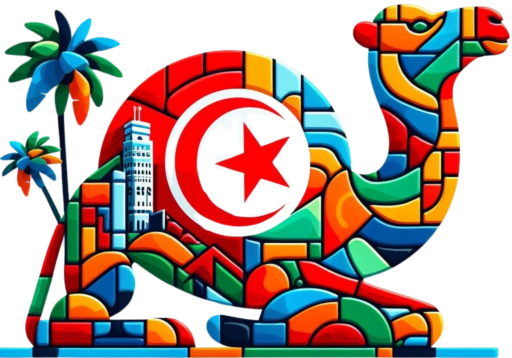Table of contents
- The beaches of Nabeul
- The cultural heritage of Nabeul
- The markets and local crafts
- Tunisian cuisine in Nabeul
- Outdoor activities in Nabeul
- Excursions near Nabeul
- Where to stay in Nabeul
- FAQs
Nabeul is one of the gems of Tunisia, located on the eastern coast of the country, about 65 kilometers east of the capital Tunis. This city, which is also the capital of the governorate of the same name, is known for its natural beauty, its rich history, and its vibrant culture. Founded by the Phoenicians, this place has gone through centuries of history, becoming an important commercial and cultural center.
Today, the city is a landmark for tourists seeking to explore the wonders of Tunisia, thanks to its enchanting beaches, lively markets, and unique cultural heritage. Nabeul’s location along the Mediterranean coast makes it an ideal place for sun and sea lovers. The city is surrounded by hills and offers a panoramic view of the sea, creating a charming atmosphere.
Nabeul is also famous for its production of ceramics and crafts, which reflect local traditions and the skill of Tunisian artisans. With a combination of natural beauty and cultural riches, it represents an unmissable destination for those who wish to immerse themselves in Tunisian culture.
The beaches of Nabeul

The main beach
The main beach, known as Plage de Nabeul, stretches for kilometers along the coast and offers crystal-clear waters and fine sand. Here, tourists can enjoy a variety of water activities, such as swimming, windsurfing, and kayaking.
A beach for all ages
The calm and shallow waters are also perfect for families with children, making this beach an ideal place to spend a relaxing day in the sun.
Other beaches to discover
Besides Plage de Nabeul, there are other beaches nearby that are worth a visit. The beach of Hammamet, located a few kilometers to the south, is famous for its luxury resorts and its turquoise waters. Here, visitors can find beach clubs equipped with sunbeds and umbrellas, as well as restaurants serving fresh fish dishes. The beauty of its beaches is not limited to just the sand and sea; the lively atmosphere of the bars and restaurants along the coast contributes to an unforgettable experience.
The cultural heritage of Nabeul

The cultural heritage of this place is rich and varied, reflecting the influences of the different civilizations that have inhabited the region over the centuries. One of the most significant places is the Archaeological Museum of Nabeul, which houses a vast collection of artifacts dating back to the Punic and Roman eras. Here, visitors can admire extraordinary mosaics, statues, and everyday objects that tell the story of the city and its evolution over time.
Another fascinating aspect of Nabeul’s cultural heritage is represented by the local craft traditions. The city is famous for the production of hand-decorated ceramics, which are a symbol of Tunisian art. Local artisans use ancient techniques to create plates, vases, and other ceramic objects that reflect the bright colors and geometric patterns typical of Tunisian culture.
Visitors can watch the artisans at work in the workshops and purchase unique pieces to take home as souvenirs.
The markets and local crafts
The markets of Nabeul are an unmissable experience for those who want to immerse themselves in the daily life of the city. The souk is a labyrinth of crowded streets where you can find fresh produce, aromatic spices, colorful textiles, and local crafts. Strolling through the stalls, visitors can savor the lively atmosphere of the market, listening to the vendors bargaining prices and interacting with customers.
Local craftsmanship is one of the highlights of the Nabeul market. In addition to ceramics, visitors can find handmade carpets, silver jewelry, and leather products. Each piece tells a story and reflects the skill of Tunisian artisans.
Buying products directly from the producers not only supports the local economy but also offers the opportunity to take home an authentic piece of Tunisian culture.
Tunisian cuisine in Nabeul
Tunisian cuisine is a sensory journey that combines intense flavors and fresh ingredients. In Nabeul, visitors can taste traditional dishes prepared with passion by local restaurants. One of the most iconic dishes is couscous, prepared with durum wheat semolina and served with meat or vegetables in a rich, spiced broth.
Every family has its own secret recipe, making couscous a unique dish in every restaurant. Another dish not to be missed is the brik, a thin pastry filled with egg, tuna, or vegetables, fried until crispy. This appetizer is very popular among locals and is often served as a snack during holidays or celebrations. The restaurants also offer a wide selection of fresh fish dishes, thanks to the city’s coastal location. Visitors can enjoy grilled fish accompanied by fresh salads and spicy sauces.
Outdoor activities in Nabeul
Water sports and adventure
Its beaches are perfect for practicing water sports such as windsurfing and kitesurfing, thanks to the favorable winds that characterize the area. Snorkeling enthusiasts can explore the seabeds rich in marine life, while boat trips offer the opportunity to discover hidden coves along the coast.
Hiking and views
For those who prefer quieter activities, there are numerous scenic trails that wind through the surrounding hills. These routes offer spectacular views of the sea and the Tunisian countryside.
Cycling and discovery
Cycling lovers can rent bicycles and venture along the coastal roads or into nearby villages, discovering breathtaking landscapes and meeting the locals.
Excursions near Nabeul
Nabeul is also an excellent starting point for exploring other nearby attractions. A few kilometers away is Hammamet, a tourist resort famous for its golden beaches and luxury resorts. Here, visitors can walk through the historic center with its cobbled streets and visit the well-preserved medina.
Another popular excursion is to the archaeological site of Carthage, located north of Tunis. This ancient Phoenician settlement offers extraordinary ruins that tell the story of the powerful civilization that once dominated the Mediterranean. Visitors can explore Roman theaters, baths, and temples dedicated to Phoenician gods.
Where to stay in Nabeul
Nabeul offers a variety of accommodation options, suitable for all budgets and preferences. For those looking for a luxurious experience, there are numerous beachfront resorts that offer full services, swimming pools, and direct access to the sea. These hotels are ideal for those who want to relax in an elegant environment and enjoy modern comforts.
For those looking for a more authentic experience, there are also options such as guesthouses or rental apartments. These accommodations allow visitors to immerse themselves in local life and often offer traditional breakfasts prepared by the owners. Regardless of the choice of accommodation, Nabeul guarantees a memorable stay in one of the most fascinating destinations in Tunisia.
FAQs
What is Nabeul?
It is a city located on the northeastern coast of Tunisia. It is known for its beaches, craft markets, and ceramic production.
How can I get to Nabeul?
Nabeul is easily accessible by land, with buses and taxis available from Tunis and other Tunisian cities. Alternatively, it can be reached by sea, with ferries available from several coastal locations.
What can I do in Nabeul?
Enjoy its beaches, explore the craft markets, visit archaeological sites, and participate in tours of ceramic production. The city also offers a variety of restaurants and cafes where you can taste the local cuisine.
What are the main attractions in Nabeul?
The main attractions include Nabeul beach, the Friday weekly market, the Archaeological Museum of Nabeul, and the ceramic workshops.
What kind of climate can I expect in Nabeul?
Nabeul has a Mediterranean climate, with hot, dry summers and mild, rainy winters. Summer temperatures can exceed 30°C, while winter temperatures rarely drop below 10°C.





